Episodes
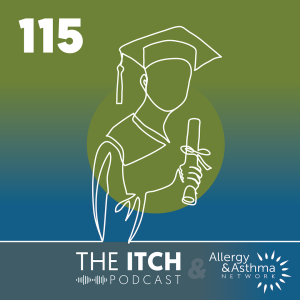
Friday Jun 06, 2025
#115 - Managing Food Allergies in College-Aged Students (Ages 18-21)
Friday Jun 06, 2025
Friday Jun 06, 2025
Stepping into young adulthood also means stepping up as the primary manager of your food allergies.
For teens and young adults with food allergies, early adulthood is an exciting but challenging shift. It’s the first time you’re the primary communicator, managing everything from dining halls to doctor’s appointments on your own. Add in new living spaces, new friends, and a growing social life, and there’s a lot to navigate.
Dr. Theresa Bingemann joins Kortney and Dr. Payel Gupta to unpack how food allergy management changes as you step into early adulthood. We cover self-advocacy skills, emergency preparedness, how to create allergy-friendly spaces in shared housing, and tips for navigating social life safely. Plus, we dive into practical advice for managing stress, staying emotionally healthy, and finding your footing in this new phase of life.
What we cover in our episode about managing food allergies in young adults:
- Self-advocacy matters. Learn how to speak up about your allergies with confidence.
- Planning ahead for emergencies. Practicing with an epinephrine device is not just for kids! Plus, knowing the available campus resources is key to feeling secure in your food allergy management.
- Creating a safe living space. Tips for setting up allergy-friendly dorm rooms and kitchens with roommates.
- Navigating social life. How to handle parties, dating, and dining out while staying safe.
- Managing emotional well-being. Support strategies for handling anxiety, stress, and the transition to independence.
Episode 6 in our “Food Allergies: Ages & Stages” series
Across six episodes, we explore how food allergies show up and shift through different phases of life, from introducing solids in infancy to navigating school and adapting in adulthood. We’re here with evidence-based info, expert insights, and lived experience to guide you through it all.
- Episode 110: Early Allergen Introduction
- Episode 111: Food Allergy Basics for Newly Diagnosed Families
- Episode 112: Managing Food Allergies in Babies and Toddlers
- Episode 113: Managing Food Allergies in School-Age Children
- Episode 114: Managing Food Allergies in Teens
AAAAI Ages & Stages PDFs
Thanks to Genentech and Aquestive for sponsoring this episode.
This podcast is for informational purposes only and does not substitute professional medical advice. Always consult with your healthcare provider for any medical concerns.
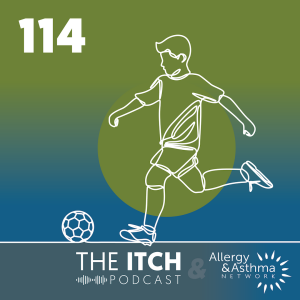
Friday May 30, 2025
#114 - Managing Food Allergies in Teenagers (Ages 12–18)
Friday May 30, 2025
Friday May 30, 2025
Independence, risk-taking, and peer pressure. Welcome to the teenage years with food allergies!
Managing food allergies during the teen years poses new challenges. Tweens and teens are gaining independence, navigating social pressures, and taking more responsibility for their health. But this is also the stage where risky behavior peaks, and the risk for severe allergic reactions is highest. That’s why clear communication and trust matter more than ever.
In this episode of our Food Allergy Stages Series, Dr. Travis Miller joins Kortney and Dr. Payel Gupta to unpack how food allergy management changes from ages 12 to 18. We talk about empowering teens through shared decision-making, building trust between parents and teens, and developing essential life skills like label reading, restaurant communication, and self-advocacy. We also dive into difficult topics like bullying, alcohol, and mental health. Finally, we address why emotional support is just as important as carrying an epinephrine auto-injector.
What we cover in our episode about managing food allergies in teens:
- Why trust matters. Teens are more likely to follow allergy routines when they feel heard and involved.
- Empowering independence. From grocery shopping to reading labels, this is the age to start turning over the reins.
- Talking about risky behavior. Alcohol and dating can put teens with food allergies at higher risk.
- Bullying and boundaries. Learn how to spot signs of bullying and who can help your teen feel safe and supported.
- Mental health and identity. Food allergies can affect confidence. We share ways to support emotional wellness and self-esteem.
Episode 5 in our “Food Allergies: Ages & Stages” series
Across six episodes, we explore how food allergies show up and shift through different phases of life, from introducing solids in infancy to navigating school and adapting in adulthood. We’re here with evidence-based info, expert insights, and lived experience to guide you through it all.
- Episode 110: Early Allergen Introduction
- Episode 111: Food Allergy Basics for Newly Diagnosed Families
- Episode 112: Managing Food Allergies in Babies and Toddlers
- Episode 113: Managing Food Allergies in School-Age Children
Thanks to Genentech and Aquestive for sponsoring this episode.
This podcast is for informational purposes only and does not substitute professional medical advice. Always consult with your healthcare provider for any medical concerns.
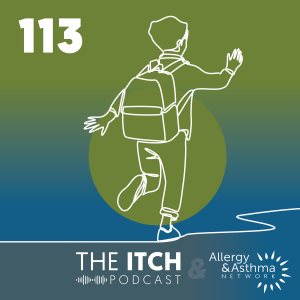
Thursday May 22, 2025
#113 - Managing Food Allergies in Children (Ages 5–11)
Thursday May 22, 2025
Thursday May 22, 2025
How do you help your child go from knowing they have a food allergy to actually managing it in everyday life?
This is the stage when everything starts to shift. Between the ages of 5 and 11, your child is learning how to describe symptoms, speak up at school, and navigate birthday parties. They’re also watching you closely and picking up how to talk about food allergies based on how you do it.
In this episode of our Food Allergy Stages & Stages Series, pediatric allergist and immunologist Dr. Dave Stukus joins Kortney and Dr. Payel Gupta to talk about how food allergy care changes in the early school years.
What we cover in our episode about managing food allergies in ages 5 to 11:
- Build awareness early. Teach kids to name their allergens, recognize symptoms, and use simple words to describe how they feel.
- Model safe behavior. Kids learn by watching you read labels, ask questions, and stay calm.
- Normalize epinephrine. Practice with a trainer and talk about it openly so it feels familiar, not scary.
- Prepare for real-life situations. From school to parties, give kids scripts and strategies to feel confident and included.
- Support emotional wellness. Watch for signs of anxiety and help your child feel empowered, not afraid.
Episode 4 in our “Food Allergies: Ages & Stages” series
Across six episodes, we explore how food allergies show up and shift through different phases of life, from introducing solids in infancy to navigating school and adapting in adulthood. We’re here with evidence-based info, expert insights, and lived experience to guide you through it all.
- Episode 1: Early Allergen Introduction (Ep. 110)
- Episode 2: Food Allergy Basics for Newly Diagnosed Families (Ep. 111)
- Episode 3: Managing Food Allergies in Babies and Toddlers (Ep. 112)
Made in partnership with the Allergy & Asthma Network. Thanks to Genentech and Aquestive for sponsoring today’s episode.
This podcast is for informational purposes only and does not substitute professional medical advice. Always consult with your healthcare provider for any medical concerns.
Timestamps
01:42 Breaking down food allergy care by age group
02:58 What kids need to know about living with food allergies
04:47 Sharing allergy information without creating fear
06:40 Talking to children about symptoms
08:40 What to tell kids about epinephrine
11:04 Helping kids without passing on fear or anxiety
13:18 Mental health signs related to food allergies
16:04 Managing allergens in the home environment
19:50 The pros and cons of allergy tables at school
21:42 Communicating with schools and daycares
25:29 Preparing for parties and sleepovers
27:33 Final tips for parenting kids with food allergies (ages 5–11)
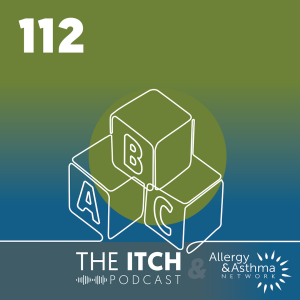
Thursday May 15, 2025
#112 - Managing Food Allergies in Babies and Toddlers (Ages 0–5)
Thursday May 15, 2025
Thursday May 15, 2025
How do you keep a baby or toddler safe with food allergies when they put everything in their mouths and can’t yet explain how they feel?
This stage of life is full of firsts, not just for your child, but for you as a parent managing food allergies. From introducing new foods to navigating daycare and watching for reactions in a child who can’t speak yet, there are countless moments you’ll need to manage. This episode focuses on building safe habits early, empowering caregivers, and showing how simple routines (like label reading or toy wiping) can make a big difference.
Allergist Dr. Basil Kahwash joins Kortney and Dr. Payel Gupta to explore how food allergy care evolves from infancy through preschool. They cover real-life, practical strategies from wiping toys and watching for symptoms to managing daycare risks and building early self-advocacy skills.
What we cover in our episode about managing food allergies in toddlers:
- Why age matters. Babies, toddlers, and preschoolers each need different safety strategies.
- What symptoms look like. Learn how reactions can show up in babies who can’t talk.
- Introducing new foods. Why early introduction still matters even after a new food allergy diagnosis.
- Daycare safety tips. How to prep caregivers and keep your child protected.
- Building habits early. From label reading to toy wiping, young kids learn by watching you.
Episode 3 in our “Food Allergies: Ages & Stages” series
Across six episodes, we explore how food allergies show up and shift through different phases of life, from introducing solids in infancy to navigating school and adapting in adulthood. We’re here with evidence-based info, expert insights, and lived experience to guide you through it all.
- Episode 1: Early Allergen Introduction (Ep. 110)
- Episode 2: Food Allergy Basics for Newly Diagnosed Families (Ep. 111)
Episodes to build a better food allergy foundation:
Made in partnership with The Allergy & Asthma Network.
Thanks to Genentech and Aquestive for sponsoring today’s episode.
This podcast is for informational purposes only and does not substitute professional medical advice. Always consult with your healthcare provider for any medical concerns.
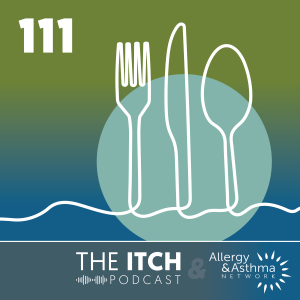
Monday May 12, 2025
#111 - Food Allergy Basics for All Ages
Monday May 12, 2025
Monday May 12, 2025
Just diagnosed with a food allergy and feeling lost? You’re not alone and don’t have to figure out food allergy life by yourself. We’re here to help you understand food allergy basics: what causes allergic reactions, how to recognize symptoms, and how to manage your allergy safely, every day.
This is the second episode in our Food Allergies: Ages & Stages, and it’s all about building a strong foundation after a new diagnosis. Whether it’s your child, your partner, or you who was recently diagnosed, Kortney and Dr. Payel Gupta walk through everything you need to know in those early days. From understanding how allergic reactions work to learning about life-saving tools like epinephrine, and new management options like OIT and omalizumab.
Dr. G explains what causes your immune system to misfire, how fast symptoms can appear, and why no two reactions are the same. We also dive into real-life strategies like carrying your epinephrine device, knowing when and how to use it, and navigating social situations. Plus, Kortney shares personal tips that have helped her live safely with food allergies for over 30 years.
What we cover in our episode about managing a new food allergy diagnosis
- What just happened?! We explain what causes allergic reactions, including the roles of IgE, histamine, and mast cells.
- Are all allergic reactions the same? Learn how quickly reactions can occur and why symptoms aren’t always predictable.
- Why is epinephrine so important? When to use epinephrine, how to use it, and why antihistamines aren't enough.
- New options to help manage food allergies. A look at treatments like OIT and omalizumab (Xolair) and why you still need to carry your epi.
- Peace of mind with an action plan. What to include in a Food Allergy Action Plan and how to help others take your allergy seriously.
Episode 2 in our “Food Allergies: Ages & Stages” series
Across six episodes, we explore how food allergies show up and shift through different phases of life, from introducing solids in infancy to navigating school and adapting in adulthood. We’re here with evidence-based info, expert insights, and lived experience to guide you through it all.
Episodes mentioned to help build your foundation:
- Episode 59: What is Anaphylaxis and When to Use Epinephrine
- Episode 95: The Science Behind Allergic Reactions
- Episode 98: Food Allergy Treatment and Management
- Ep. 110: Early Introduction of Allergenic Foods – Preventing Food Allergies Before They Start
Made in partnership with The Allergy & Asthma Network.
Thanks to Genentech and Aquestive for sponsoring today’s episode.
This podcast is for informational purposes only and does not substitute professional medical advice. Always consult with your healthcare provider for any medical concerns.
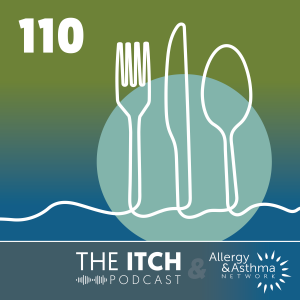
Friday May 02, 2025
Friday May 02, 2025
Did you know you could potentially reduce your baby’s risk of developing food allergies by up to 80%?
That’s the power of early allergen introduction. Feeding a baby the top 9 allergens consistently starting between 4 to 6 months can make a life-changing difference.
We’re launching a brand-new series about food allergies at various stages of life. Whether you’re just starting solids, navigating a new diagnosis, or in a new stage of life, this series is here to support you with evidence-based tips and real talk. In this first episode, Kortney and Dr. Payel Gupta explore how to potentially prevent food allergies before they even develop.
Why do you want to know more about introducing allergens to baby?
For years, parents were told to wait until toddlers were older before introducing allergenic foods. But groundbreaking research, including the LEAP, LEAP-On, and PETIT studies, turned that advice on its head.
We no longer wait to feed babies food allergens. Instead, early (around 4–6 months) and sustained exposure to top allergens like peanut and egg is recommended for all babies. In this episode, Dr. G and Kortney explain the studies, walk you through how to do it safely, and bust common myths that leave parents confused or anxious.
What we cover in our episode about early allergen introduction
- Why guidelines changed: Learn how the LEAP & PETIT studies reshaped allergy prevention.
- How to introduce the top 9 allergenic foods safely, including forms that are appropriate for infants.
- What “sustained exposure” means and how often to serve allergens after that first taste.
How eczema increases allergy risk and what transcutaneous sensitization means. - What allergic signs to watch for: mild hives vs. serious allergic reactions and when to call the doctor.
More resources about food allergy prevention
- USDA Updates Dietary Guidelines to Include Introduction of Food Allergens
- Delaware Adopts Law Covering Early Introduction of Food Allergens
- What is a food allergy?
- American Academy of Pediatrics Early Feeding Guidelines
- AAAAI / ACAAI handouts on introducing peanut & egg
- FARE: How to Use Peanut Puffs Safely
- Solid Starts: Peanut Butter Guide (Creative Ways to Serve)
- PreventAllergies.org Recipe Library
- Our infant anaphylaxis episode (with Dr. Mike)
Made in partnership with the Allergy & Asthma Network. Thanks to Genentech and Aquestive for sponsoring today’s episode.
This podcast is for informational purposes only and does not substitute professional medical advice. Always consult with your healthcare provider for any medical concerns.

Thursday Apr 24, 2025
#109 - Tezepelumab & Nasal Polyps: Inside the WAYPOINT Phase III Trial
Thursday Apr 24, 2025
Thursday Apr 24, 2025
Have you wondered why having more drug options matters for chronic rhinosinusitis with nasal polyps?
In the inaugural episode of our new series, The Itch Review, co-hosts Kortney and Dr. Payel Gupta, along with special guest Dr. Michael Blaiss, unpack the journal article "Tezepelumab in Adults with Severe Chronic Rhinosinusitis with Nasal Polyps," published in the New England Journal of Medicine on March 1, 2025.
This article is about the Phase III WAYPOINT trial of tezepelumab. Already approved for severe asthma, this once-monthly biologic is now showing promise in chronic rhinosinusitis with nasal polyps (CRSwNP). Over 52 weeks, 408 patients were randomized to receive 210 mg of tezepelumab every four weeks or placebo. Researchers tracked nasal-polyp scores, congestion, sense of smell, and rates of rescue surgery.
In this episode, we provide a brief overview of what CRSwNP is, why inflammation drives polyp formation and how blocking TSLP fits into today’s biologics options. We’ll walk you through the WAYPOINT Phase III design, explain the primary and secondary endpoints, and translate the headline results into what they mean for real-world patients who’ve exhausted their treatment options.
What we cover in our episode about treating chronic rhinosinusitis with nasal polyps with tezepelumab
- CRSwNP basics & tezepelumab mechanism of action: How nasal polyps form and why targeting TSLP can reduce inflammation
- WAYPOINT design: 52-week, placebo-controlled Phase III study in 408 patients
- Primary endpoints: Mean change in nasal polyp score and nasal-congestion score
- Secondary endpoints: Smell recovery, need for rescue surgery or systemic steroids, and quality-of-life measures
- Why choice matters: Every CRSwNP patient responds differently, and having more treatment options means more chances to find the right fit
Made in partnership with The Allergy & Asthma Network. Thanks to AstraZeneca for sponsoring today’s episode.
This podcast is for informational purposes only and does not substitute professional medical advice. Always consult with your healthcare provider for any medical concerns.
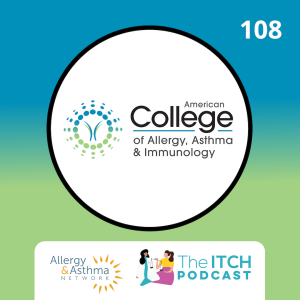
Thursday Apr 17, 2025
#108 - Interview with Dr. James Tracy, ACAAI President
Thursday Apr 17, 2025
Thursday Apr 17, 2025
Ever wonder who’s working behind the scenes to improve allergy care nationwide?
In this episode, we sit down with Dr. James Tracy, the 2024-2025 president of the American College of Allergy, Asthma & Immunology (ACAAI), to explore how the College supports both patients and clinicians. Dr. Tracy shares how he got involved, what drives his leadership, and what’s ahead for the future of allergy and asthma care.
From workforce shortages to the promise of AI in medicine, this conversation takes you behind the curtain of the specialty. Plus, we dig into how patients and providers alike can make a difference through advocacy.
What we cover in our episode about ACAAI, leadership & allergy care
- Dr. Tracy’s unique path to leadership: How his non-traditional journey from practicing in rural Nebraska to leading the ACAAI shaped his approach to advocacy and patient care.
- Creating leadership opportunities: Why mentorship and involvement in ACAAI committees can open doors for clinicians, fellows-in-training, and future leaders in allergy and immunology.
- Patient tools that make a difference: Free ACAAI resources that help patients better understand and manage their conditions.
- The evolving role of the allergist: How allergists are uniquely trained to manage complex conditions and why that matters as technology, treatment options, and care delivery evolve.
- Future-focused leadership at ACAAI: Dr. Tracy’s vision for tackling workforce shortages, embracing AI and gene editing, and keeping patient care at the center of innovation.
Resources:
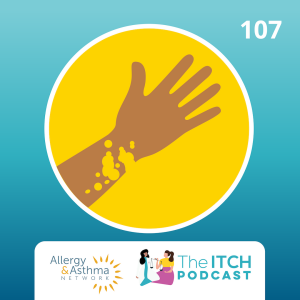
Thursday Apr 10, 2025
#107 - Understanding Hives in the Latinx Population
Thursday Apr 10, 2025
Thursday Apr 10, 2025
Ever wonder how culture and language barriers affect diagnosing chronic spontaneous urticaria (CSU) in Latinx patients?
In this episode, allergist Dr. Juanita Mora joins Kortney and Dr. Gupta to discuss chronic spontaneous urticaria (hives) and the unique challenges faced by the Latinx community. They highlight the importance of cultural competency in health care and the barriers that Latinx patients often encounter, such as language differences and access to specialists. They also discuss how Latinx patients are often not given all treatment options for hives, such as biologics.
Dr. Mora emphasizes the importance of having resources available in Spanish and encourages patients and families to advocate for their care. They explore practical tips on how technology, family support, and proper patient education can help overcome barriers, leading to better diagnosis, treatment, and improved quality of life for Hispanic patients managing CSU.
What we cover in our episode about chronic hives in the Latinx community:
- Diagnosing hives in skin of color: How CSU symptoms can present differently on darker skin tones, making accurate diagnosis harder.
- Overcoming barriers for Latinx patients: The specific hurdles the Latinx community faces like language barriers, limited access to Spanish-speaking allergists, and challenges obtaining advanced treatments such as biologics.
- Role of family and community support: How involving family members and community leaders can improve CSU awareness, reduce stigma, and encourage patients to seek timely medical treatment.
- Importance of Spanish-language patient education: Why accessible, culturally relevant education and resources in Spanish are essential for empowering Latinx patients to manage their CSU effectively.
- Cultural beliefs and CSU diagnosis: How cultural perceptions around health and family influence the timing of diagnosis and willingness to seek medical care.
Resources Spanish
- ¿Qué es la urticaria crónica?
- Urticaria Crónica - Dr. Antonio Olvera
- Urticaria crónica espontánea/idiopática (erupción crónica)
- Protocolo urticaria cronica
Resources English
- Chronic Urticaria Management, Resources & Glossary of Terms
- Chronic Hives: 10 Actions to Support Your Mental Health
- Why Are My Hives Not Going Away?
Made in partnership with The Allergy & Asthma Network. Thanks to Novartis for sponsoring today’s episode.
This podcast is for informational purposes only and does not substitute professional medical advice. Always consult with your healthcare provider for any medical concerns.
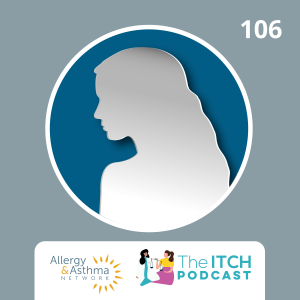
Thursday Mar 27, 2025
#106: The Risks and Realities of Steroid Overuse for Eczema
Thursday Mar 27, 2025
Thursday Mar 27, 2025
Have you ever wondered if steroids are the best choice for managing your eczema?
While both topical and oral steroids offer quick relief from severe eczema flares, understanding their long-term risks and safer alternatives can dramatically improve your quality of life.
In this episode, Dr. Mondana Ghias joins Kortney and Dr. Gupta to discuss the complex role of systemic corticosteroids in eczema management. They dive deep into the short-term relief that steroids provide for severe eczema symptoms and emphasize why steroids must be approached cautiously due to potential side effects and dependency risks.
Dr. Ghias also highlights the unique challenges of eczema care for individuals with skin of color, addressing differences in treatment response and the common issue of hypopigmentation caused by topical steroids.
What we cover in our episode about steroid use in eczema treatment:
- Role of Systemic Steroids: When steroids are necessary and how they quickly manage severe eczema flares.
- Risks and Side Effects: Understanding the serious long-term effects of systemic and topical steroids.
- Steroid Withdrawal: Recognizing the signs of steroid withdrawal and strategies to manage rebound effects.
- Challenges of Topical Steroids for Skin of Color: The unique risks of steroid use and managing hypopigmentation.
- Alternatives to Steroids and Innovative Treatments: The rise of biologics and targeted therapies offering safer, long-term solutions.
- The Importance of Specialist Care: Working with a dermatologist or allergist will help you find a sustainable long-term management plan.
Made in partnership with The Allergy & Asthma Network. Thanks to Sanofi and Regeneron for sponsoring today’s episode.
This podcast is for informational purposes only and does not substitute professional medical advice. Always consult with your healthcare provider for any medical concerns.

